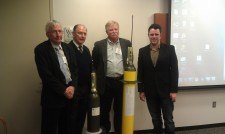National Oceanographic Partnership Program Celebrates Argo One-Millionth Ocean Observation Milestone

Innovative Global Observing System Funded Under NOPP for First 12 Years
Washington, DC – In celebration of the Argo Program’s one-millionth ocean observation profile of the upper 2,000 meters of the ocean, the National Oceanographic Partnership Program (NOPP) held a mini-symposium attended by renowned ocean scientists from around the globe. The Argo Program has created a weather system for the ocean with its global array of more than 3,000 free-drifting, profiling floats that measure the temperature and salinity of the upper ocean, which allows for the first time in history, the continuous monitoring of these ocean aspects. All data collected by the floats is relayed and made publicly available within hours after collection.
The internationally focused, three hour mini-symposium included an introduction given by Steve Piotrowicz, Program Manager of the National Oceanic and Atmospheric Administration (NOAA) Climate Program Office of Climate Observation, and high-level presentations by four senior scientists who are key individuals in the Argo Program:
- Dr. Dean Roemmich, Argo Co-Chair from Scripps Institution of Oceanography – A Paradigm for Ocean Observations in the 21st Century, focused on the history of collecting ocean observations and how Argo drastically improved data collection capabilities.
- Dr. James Cummings from U.S. Naval Research Laboratory – Ocean Observing and Operational Ocean Forecasting, aimed at utilizing real-time Argo data and implementing it into models to improve ocean forecasting.
- Dr. Susan Wijffels, Argo Co-Chair from the Commonwealth Scientific and Industrial Research Organization, Australia – New Insights into the Oceans and Climate from Argo, discussed specific examples of Argo data being used to gain insights into the climate of the Southern Ocean and oceanic Mixed Layer.
- Dr. Joshua Willis from NASA/Jet Propulsion Laboratory – The Global Warming Yardstick, Argo and Our Toolbox for Climate Change,focused on using Argo data as a tool for measuring and monitoring sea level rise and other climate indicators.
The Argo Program is critical in understanding global change. The data collected by the program’s array of floats improves the understanding of sea level rise and other aspects of ocean variability and change in the climate system, including heat balance and changes in rainfall patterns.
NOPP and oceanographers around the world celebrated Argo’s benchmark in ocean monitoring as it has changed the speed at which ocean observation profiles are taken. Until Argo, since the late 19th century, oceanographers had approximately collected only 500,000 profiles in the upper 1,000 meters and approximately only 200,000 profiles in the upper 2,000 meters of the ocean’s surface. Now, because of Argo, it will only take eight years to collect the next million ocean observation profiles.
There are 28 countries involved in the Argo program, which costs $25 million annually to run. The United States is the largest provider of sensors to the global array network.
“Argo has moved oceanography from the realm of regional data collection to global and systematic observation of the subsurface oceans,” said Dr. Roemmich. “By implementing a global ocean observing system, Argo has made large contributions to basic ocean research, education, monitoring, and assessment of the climate system, as well as to operational ocean forecasting.”
The Argo Program was originally funded through the NOPP in 1999. It continued to be implemented through the NOPP through 2011. Today, Argo is funded as tasks under cooperative agreements with three academic institutions, Scripps Institution of Oceanography, Woods Hole Oceanographic Institution, and the University of Washington; and through partnerships with NOAA’s Atlantic Ocean and Meteorological Laboratory and the Pacific Marine Environmental Laboratory.
“The NOPP Program Office is delighted that a program funded through NOPP for 12 years has reached such an extraordinary milestone,” said Allison Miller, NOPP Office Program Manager. “The Program Office applauds Argo on its float deployment and continuous data sets that are essential in understanding our changing ocean.”
More information on the ARGO program can be found on the UCSD project website and NOAA’s ARGO page.


